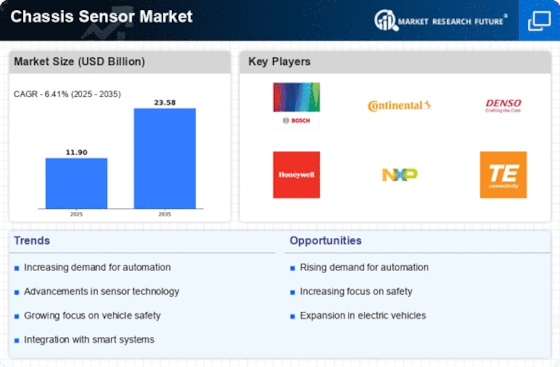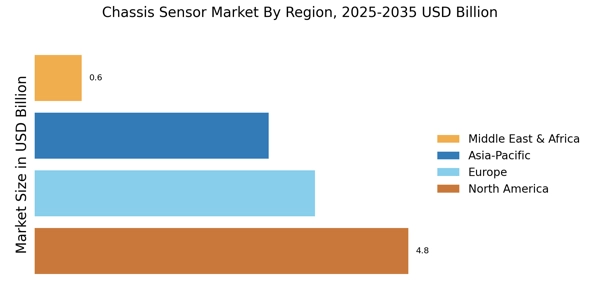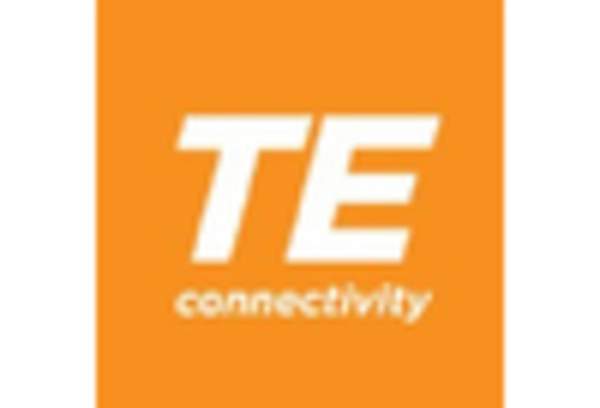Growth of Electric and Hybrid Vehicles
The rise of electric and hybrid vehicles is significantly influencing the Chassis Sensor Market. As automakers pivot towards sustainable transportation solutions, the demand for chassis sensors that can effectively monitor and manage the unique dynamics of electric and hybrid vehicles is increasing. These vehicles often require specialized sensors to optimize performance and energy efficiency. By 2025, it is estimated that electric and hybrid vehicles will constitute nearly 30% of new vehicle sales, thereby creating a substantial market for chassis sensors tailored to these technologies. This trend not only reflects changing consumer preferences but also highlights the industry's adaptation to evolving automotive landscapes.
Emerging Markets and Urbanization Trends
Emerging markets and urbanization trends are contributing to the growth of the Chassis Sensor Market. As urban populations expand, the demand for efficient and safe transportation solutions is increasing. This urbanization is prompting governments and manufacturers to invest in infrastructure and vehicle technologies that can accommodate growing populations. In 2025, it is anticipated that regions experiencing rapid urbanization will see a rise in vehicle ownership, thereby driving the need for advanced chassis sensors. This trend presents a unique opportunity for manufacturers to cater to new markets, potentially leading to increased sales and market penetration.
Rising Demand for Vehicle Safety Features
The Chassis Sensor Market is experiencing a notable surge in demand for enhanced vehicle safety features. As consumers become increasingly aware of safety standards, manufacturers are compelled to integrate advanced chassis sensors into their vehicles. This trend is further supported by regulatory bodies that are imposing stricter safety regulations, thereby driving the adoption of technologies that can monitor vehicle dynamics and improve overall safety. In 2025, the market for chassis sensors is projected to reach a valuation of approximately 3 billion USD, reflecting a compound annual growth rate of around 8%. This growth is indicative of the industry's commitment to prioritizing safety, which is likely to remain a key driver in the coming years.
Technological Advancements in Sensor Technology
Technological advancements are playing a pivotal role in shaping the Chassis Sensor Market. Innovations in sensor technology, such as the development of more sensitive and accurate sensors, are enabling manufacturers to enhance vehicle performance and safety. The integration of Internet of Things (IoT) capabilities into chassis sensors allows for real-time data collection and analysis, which can lead to improved vehicle diagnostics and predictive maintenance. As of 2025, the market is expected to witness a significant increase in the adoption of smart sensors, which are anticipated to account for over 40% of the total market share. This shift towards smarter technology is likely to drive competition among manufacturers, fostering further innovation.
Increasing Investment in Automotive Research and Development
Investment in automotive research and development is a crucial driver for the Chassis Sensor Market. As manufacturers strive to innovate and stay competitive, they are allocating significant resources towards the development of advanced chassis sensor technologies. This investment is often directed towards enhancing sensor accuracy, reliability, and integration with other vehicle systems. In 2025, it is projected that R&D spending in the automotive sector will exceed 20 billion USD, with a considerable portion dedicated to sensor technology. This focus on R&D is likely to yield new products and solutions that can address the growing demands of consumers and regulatory bodies alike.
















